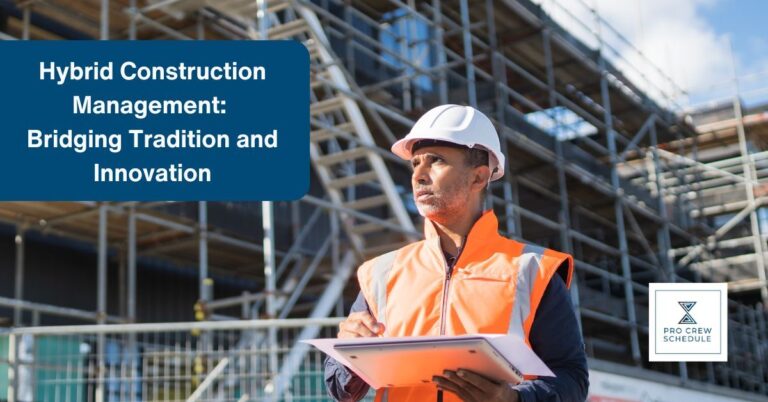In the dynamic construction world, where every project presents its unique challenges and opportunities, hybrid construction management has emerged as a symbol of efficiency and adaptability. Combining traditional practices with modern technologies, hybrid construction management harnesses the best of both worlds to streamline processes, enhance communication, and ultimately deliver projects more effectively.
What Is Hybrid Construction Management?
Hybrid construction management represents a modern approach that seamlessly integrates traditional construction management principles with advanced construction management software and digital technologies. This blending of time-tested methodologies with cutting-edge tools allows project teams to optimize efficiency, enhance communication, and achieve superior project outcomes.
At its core, hybrid construction management leverages the foundational practices of traditional management, such as meticulous planning, effective resource allocation, and onsite supervision. These elements ensure that projects are meticulously planned and executed to meet client expectations and regulatory standards. But before we dive into the hybrid approach to managing construction, let’s first take an overview of where it all started.
Traditional Vs. Hybrid Construction Management: What is the Difference?
In the realm of construction project management, traditional and hybrid management approaches present distinct methodologies, each tailored to meet specific challenges and maximize different strengths. Understanding the differences between these approaches is essential for teams looking to optimize project outcomes in today’s dynamic construction industry landscape.
Traditional Construction Management
Traditional construction management is rooted in time-tested practices prioritizing senior professionals’ knowledge, sequential planning, and hands-on supervision. Project managers rely heavily on their expertise in construction techniques, materials, and local regulations to guide projects from conceptualization to completion. This approach follows a linear progression of phases—from initial planning and design to procurement, construction, finishing, and final handover.
Traditional construction management relies on accumulated experience over decades of building projects. Here are three main pillars of the traditional approach in construction:
- Planning and Coordination: Traditional management begins with thorough planning, where project scope, timelines, and resource allocation are meticulously identified. This first phase lays the groundwork for a project’s success, mapping out the sequence of tasks and identifying potential challenges before they arise. Material schedule in construction is crucial during this planning phase, ensuring that materials are procured and delivered on time to avoid delays and keep the project on track.
- Onsite Supervision: Once construction begins, project managers play a crucial role in overseeing daily operations. They ensure that tasks are executed according to plan, monitor quality standards, and address any issues promptly to maintain progress and uphold safety protocols.
- Relationship Management: Building strong relationships with stakeholders—clients, contractors, and regulatory bodies—is another strength of traditional management. Effective communication and transparent collaboration foster trust and ensure that everyone is aligned in achieving the project’s goals.
Hybrid Construction Management
In contrast, hybrid construction management integrates advanced technologies and digital tools into traditional management practices. This includes adopting construction management software, Building Information Modeling (BIM), IoT (Internet of Things) devices, and cloud-based collaboration platforms.
Hybrid management embraces a more agile approach than traditional methods’ linear progression. It allows flexibility and resiliency to changes, optimizes workflows, and adapts to evolving project requirements. Real-time data analytics provided by IoT devices enable managers to monitor project performance metrics, resource allocation, and environmental conditions, empowering them to make informed decisions quickly. Below are some of the hybrid innovations we see in the construction scene.
- Building Information Modeling (BIM): At the forefront of this digital revolution is BIM, a powerful tool that enables stakeholders to create detailed 3D models of buildings and infrastructure. Beyond visualization, BIM facilitates collaboration among architects, engineers, and contractors by integrating various project data into a centralized platform. This ensures all parties work from the same information, minimizing errors and optimizing efficiency.
- Construction Crew Management Software: Cloud-based project management software, like Pro Crew Schedule, has become crucial in modern construction management. These platforms offer real-time collaboration, document sharing, and task-tracking functionalities, empowering teams to communicate seamlessly and adapt quickly to changing project conditions. Mobile accessibility further enhances flexibility, allowing managers to monitor progress and address issues from anywhere, at any time.
Crew planning software enhances collaboration by enabling seamless communication and collaboration among dispersed teams. This fosters a culture of accountability and transparency, ensuring all stakeholders agree with project goals and objectives.
- IoT and Automation: The Internet of Things (IoT) has paved the way for a new era of connectivity within construction sites. Smart sensors and wearable devices collect real-time data on everything from equipment utilization to environmental conditions, providing insights that optimize resource allocation and improve safety. Automation technologies like robotics and drones further streamline tasks like surveying and material delivery, reducing labor costs and enhancing precision.
What are the Challenges of the Hybrid Approach in Construction Management?
Hybrid construction management, while offering numerous benefits, also comes with its own set of challenges that project teams must navigate to ensure successful implementation and operation:
- Integration and Training of Technologies: One of the primary challenges is effectively integrating diverse technologies like construction management software, BIM, IoT devices, and cloud platforms. Ensuring these systems work seamlessly together requires upfront planning, technical expertise, and sometimes custom integration solutions.
Adopting new technologies often necessitates training for project teams to utilize them effectively. Not all team members may be familiar with the latest software or BIM processes, requiring time and resources to upskill and ensure everyone is on the same page.
- Data Management and Security: With the abundance of digital data generated by IoT devices and construction software, managing and securing this data becomes crucial. Ensuring data privacy, security against cyber threats, and maintaining data integrity are ongoing challenges that require robust protocols and monitoring.
While technology can mitigate risks through real-time monitoring and data analytics, it also introduces new risks, such as data breaches or system failures. Developing comprehensive risk management plans that address traditional and technological risks is essential to project success.
- Maintenance and Support: Ongoing maintenance and support for technology infrastructure and software systems are critical. Ensuring systems are updated, troubleshooting issues promptly, and providing continuous support to users are necessary to prevent project timelines and deliverables disruptions.
Navigating these challenges requires a strategic approach, collaboration among project stakeholders, and a commitment to effectively leveraging technology to achieve the desired outcomes of efficiency, collaboration, and project success in hybrid construction management.
How Can Hybrid Approach Maximize Synergy in Construction?
Hybrid construction management brings together the best of traditional project oversight with modern technological advancements, offering several practical advantages that cater to the dynamic needs of today’s construction projects:
- Integration of Technology: Hybrid management enhances project efficiency and effectiveness by incorporating construction crew management software, Building Information Modeling (BIM), IoT devices, and cloud-based platforms. These tools streamline communication, facilitate real-time data sharing, and improve collaboration among project teams.
- Enhanced Communication: Digital platforms enable seamless communication across dispersed teams, regardless of geographical locations. This fosters quicker decision-making, reduces misunderstandings, and ensures everyone stays updated on the project’s progress and changes.
- Flexibility and Adaptability: Unlike traditional methods, hybrid management allows flexibility in responding to changes in project scope or unexpected challenges. This agility ensures that adjustments can be made swiftly without disrupting overall project timelines.
- Improved Decision-Making: Real-time data analytics from IoT devices provide valuable insights into project performance metrics, resource allocation, and environmental conditions. This empowers construction managers to promptly make informed decisions, address issues, and optimize project outcomes.
- Efficiency Gains: Automating routine tasks and digitizing project documentation minimize manual errors and administrative burdens. This streamlines workflows, reduces paperwork, and ultimately saves time and costs throughout the project lifecycle.
- Support for Sustainable Practices: Hybrid management promotes sustainable construction practices by leveraging BIM for efficient design optimization, material use reduction, and energy-efficient building solutions. This meets environmental standards and enhances the project’s long-term sustainability and attractiveness.
- Client Satisfaction: Hybrid management enhances client satisfaction by combining efficient project management practices with transparent communication and high-quality deliverables. Clear expectations, timely updates, and adherence to budget and schedule contribute to building strong client relationships and repeat business.
In essence, hybrid construction management represents a forward-thinking approach that leverages technology to overcome traditional challenges. It empowers construction teams to deliver projects more efficiently, sustainably, and collaboratively, setting new standards for success in the ever-evolving construction industry.
Looking Ahead: The Future of Hybrid Construction Management
As technology continues to evolve and projects grow increasingly complex, the role of hybrid construction management will only become more pivotal. Embracing innovation while honoring time-tested practices allows project teams to navigate challenges confidently, delivering sustainable, cost-effective solutions that meet today’s and tomorrow’s needs.
In conclusion, hybrid construction management represents a transformative approach that harmonizes tradition with innovation. By blending the experience-driven insights of traditional management with the transformative power of digital tools and technologies, construction projects can achieve greater efficiency, sustainability, and overall success. Incorporating crew planning software like Pro Crew Schedule further enhances efficiency by facilitating streamlined allocation of labor resources, optimizing workforce productivity, and maintaining project timelines effectively.







